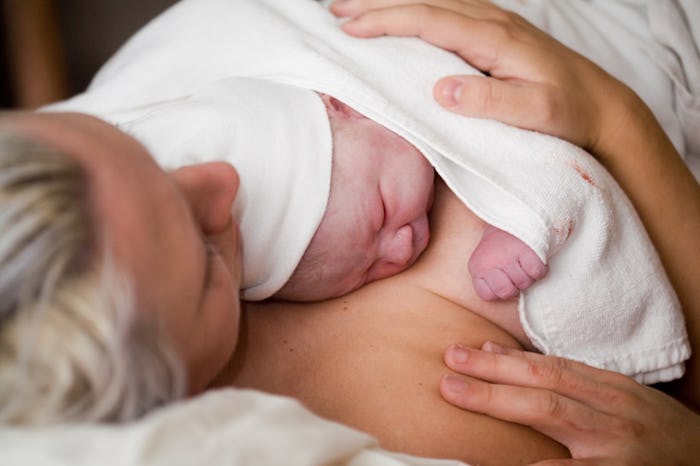There are a lot of hours to be wary of in parenting: the witching hour, the bedtime hour. But there's another hour you won't dread and, honestly, you'll only get it once with each of your children: the golden hour. So what is the golden hour and why is it so lovely?
According to Lamaze Certified Childbirth Educator (LCCE) and Fellow of American College of Childbirth Educators (FACCE) Deena Blumenfeld of Shining Light Prenatal Education, the golden hour refers to the first hour after birth. "This is the time when baby is alert, active, and ready to initiate breastfeeding," Blumenfeld tells Romper. "The uninterrupted skin-to-skin contact between mother and baby are part of the normal physiologic process designed to help baby find the breast, bond with mom, and help mom expel the placenta."
Blumenfeld notes that your baby goes through nine different stages right after birth: crying, relaxation, awakening, activity, resting, crawling, familiarization, suckling, and then sleeping. "Ideally, the golden hour works best when mom and baby are both healthy and we delay any non-necessary infant tests and procedures until after baby has had their first breastfeeding. If mother and/or baby are not healthy, then those needs take precedence," she says. According to Sanford Health, instead of having your baby taken away to be weighed, swaddled, given a vitamin K shot, and bathed, your baby is left with you for a full 60 minutes of skin-to-skin contact and breastfeeding.
Basically? It gives you time to bond. A 2014 article published in The Journal of Perinatal Education noted that babies have a "heightened response to tactile, odor, and thermal cues" at birth that, when placed immediately on their mother's chest, stimulate their biological needs. The article also noted that the golden hour has several benefits for the mother as well, like stimulating the production of oxytocin, which contracts the uterus back to its pre-pregnancy size, and the golden hour releases beta-endorphin, a hormone that helps a mother respond to her baby and helps her to feel calm by "reinforcing the pleasure of her actions."
If you're planning on breastfeeding, the golden hour can also promote a successful breastfeeding relationship. The American Academy of Pediatrics (AAP) recommended that if a baby is healthy and not in any distress, it should remain on its mother's chest until breastfeeding has been established. Nothing, including the vitamin K injection or a bath, should take precedence over establishing breastfeeding. The AAP noted that babies are able to latch on to their mother's breast without any assistance and shouldn't be disturbed, so some necessary tasks, like assigning Apgar scores and giving the mother and baby ID bracelets, can happen while the child is on the mother's chest during that golden hour.
All biology aside, that first hour is also pretty great just for you to relax, enjoy your baby, and rest from giving birth. But, for whatever reason, if you aren't able to experience it, don't panic. "If there is a health issue and that first hour skin-to-skin wasn't able to happen, moms shouldn't despair," Blumenfeld says. "Babies will go through the stages from resting to sleeping the next time skin-to-skin is offered; they retain this breast crawl ability for around four months. So, even if baby is separated from mom for some time, this process can still happen."
If you want to make sure you have the golden hour, you're in luck. Blumenfeld notes that this is a common practice in most hospitals. But make sure it's in your birth plan and discuss it with your healthcare provider so you're all on the same page, just in case a hospital's policies differ.
